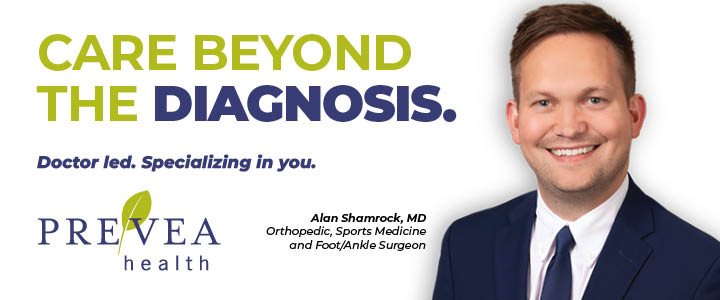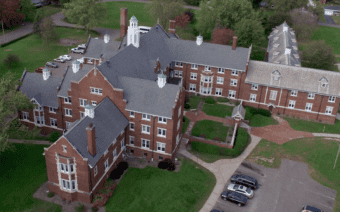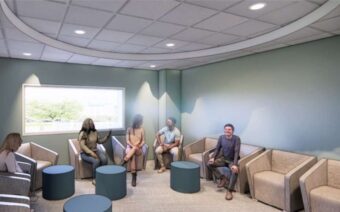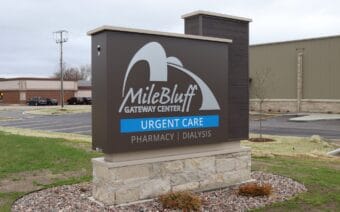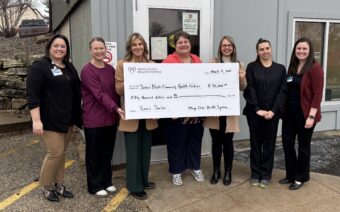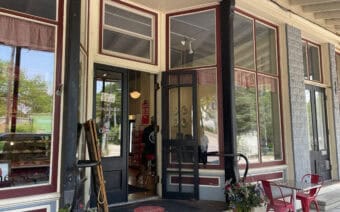
May 27, 2024
EAU CLAIRE – Dr. Eric Spears, who specializes in osteopathic medicine, said when it comes to his patients, he is always making sure they have the best care.
That’s why, in the wake of recent hospital closures in the Eau Claire area, Eric said he knew he made the right decision by opening his own practice – Spears Pain & Rehab (3864 Talmadge Road).
“I’m particular about what my patients need and when a practice needs to maximize its quality and best serve the community,” he said. “A large healthcare system is unable to do that.”
Spears opened his private PM&R (or physical medicine and rehabilitation) practice at the beginning of April, a process he said was about six months in the making – from learning how to create a business plan, to financials and bank loans to the architecture of the space.
“It’s a great location – about 2,000 square feet, which, financially, is perfect for a startup medical practice,” he said. “Because (it was) an empty shell, I got to design the floor plan with the architects at Lindal (Architects Collaborative).”
Before opening his practice, Eric said he served as the inpatient rehab medical director of the Sacred Heart Hospital from 2019 to 2023, as well as working at an outpatient Prevea PM&R clinic.
Services and treatment
Spears Pain & Rehab, Eric said, focuses on a variety of different kinds of care, such as pain management, physical rehabilitation, sports medicine, nerve testing and medical botox (not cosmetic).
“Ninety percent of the human body’s function – walking or talking or thinking – is neurological and musculoskeletal,” he said. “We have a particular interest in those body systems.”
With PM&R, “its not confined to one organ system like most medical specialties are.”
Essentially, he said Spears Pain & Rehab can help with “anything that impacts your functioning” – from an athlete who can’t participate in a sport due to injury or someone in a nursing home wanting to get to the bathroom without assistance.
People who are dealing with out-patient rehabilitation after a serious medical condition – such as a stroke, spinal cord injury or other types of neurological conditions – are patients Eric said his practice works with as well.
Eric said it’s important to note he takes a holistic approach to treating clients, and the plan is unique to what they need.

Treatment options, depending on a patient’s diagnosis, can include:
- Dry needling
- Osteopathic manipulation
- Prosthetics and orthotics
“I base my adjustments based on what I find on the physical exam and knowing what the patient has,” he said. “So, discussing exercise, diets and education. But No. 1 is making sure (they have) the right diagnosis – some people come here and that’s the problem, (they weren’t given the right diagnosis).”
Each room in the clinic has a screen that Eric said he uses to display 3D models through a bio-digital program to better show patients the parts of the body he’s working with.
Though an independent clinic owner, Eric said he works with Dr. Carol Sue Carlson and Dr. Kamal Thapar with Chippewa Valley Orthopedics and Sports Medicine for interventional spine treatments.
“(Carlson) does a lot of spinal injections, and she does all the other stuff my field sub-specializes in,” he said. “And we work with Thapar, who’s the best neurosurgeon in town.”
Care at the forefront
Eric said the clinic’s mission statement is twofold.
“One: to ease suffering,” he said. “And two: to bridge the gap between a patient’s current and potential life functioning.”
When patients come to the clinic, Eric said he wants them to feel comfortable and tell him about their problems without fear of judgment.
“When they tell me what their pain is, I take it at face value – I do not judge their report of it or presume they’re lying,” he said. “I listen and take what they say at high value.”
As someone who has Ankylosing Spondylitis (also known as Bechterew’s disease) – an autoimmune disorder of the spine – and has had a spinal fusion, Eric said he understands it can be difficult to talk about the pain and problems openly.
“A lot of (rehab patients) have been to doctors where they feel like the doctor didn’t listen, or the doctor said there’s nothing they can do,” he said. “(Whereas) the physiatrist (a medical doctor who specializes in pain management and rehabilitation) comes in (and shows you) what you can do to live a better life despite having a medical problem.”
Eric said another aspect of physiatrists that can be different from other fields is the focus put on a patient’s social history.
“What kind of house do you live in? How’s your financial situation? Is it easy to get to the clinic – do you drive? What do you do for fun? What do you do for work?” he said. “Sometimes (when) I ask people, they get surprised when I ask.”
The point of “zooming out,” as Eric said he describes it, is to see how a patient’s surrounding environment affects their condition and treatment.
“If you were to break a leg and you need help getting dressed because the doctor told you you couldn’t put weight on your leg for, let’s say three months, who would help you?” he said. “People don’t (always) think that way.”
Oakleaf Medical Network
Eric said Spears Pain & Rehab is part of Oakleaf Medical Network – an Eau Claire-based, independent, physician-owned and operated network of health services.
The network is made up of more than 175 providers and clinics among 30 communities throughout Wisconsin and Minnesota.
Several specialty clinics in the area, Eric said, are also under the network umbrella, such as Hesse Foot and Ankle Clinic, Evergreen Surgical and Chippewa Valley Orthopedic and Sports Medicine.
“The importance of the network, at the most basic level, is does your insurance cover the cost?” he said. “But, it’s also sharing patients with other specialists… (Oakleaf Medical Network is) proactive in getting a community hospital back together.”
Patient response
Since opening last month, Eric said his patients are “happy” and “surprised.”
“I think they expected coming to a pain clinic to feel doom and gloom, but they’re realizing we’re a happy, exciting bunch to be around,” he said. “A lot of them say, ‘no one has ever listened to me that way.’”
Eric said it’s been a rewarding experience to help patients in a variety of different facets.
“I always think, ‘what am I going to do for this person?’ – but then I meet them and (realize) they needed to see me,” he said.
 A menagerie of alpacas, llamas, porcupines, more
A menagerie of alpacas, llamas, porcupines, more Daigle Brothers – Building Wisconsin one steel column at a time
Daigle Brothers – Building Wisconsin one steel column at a time

